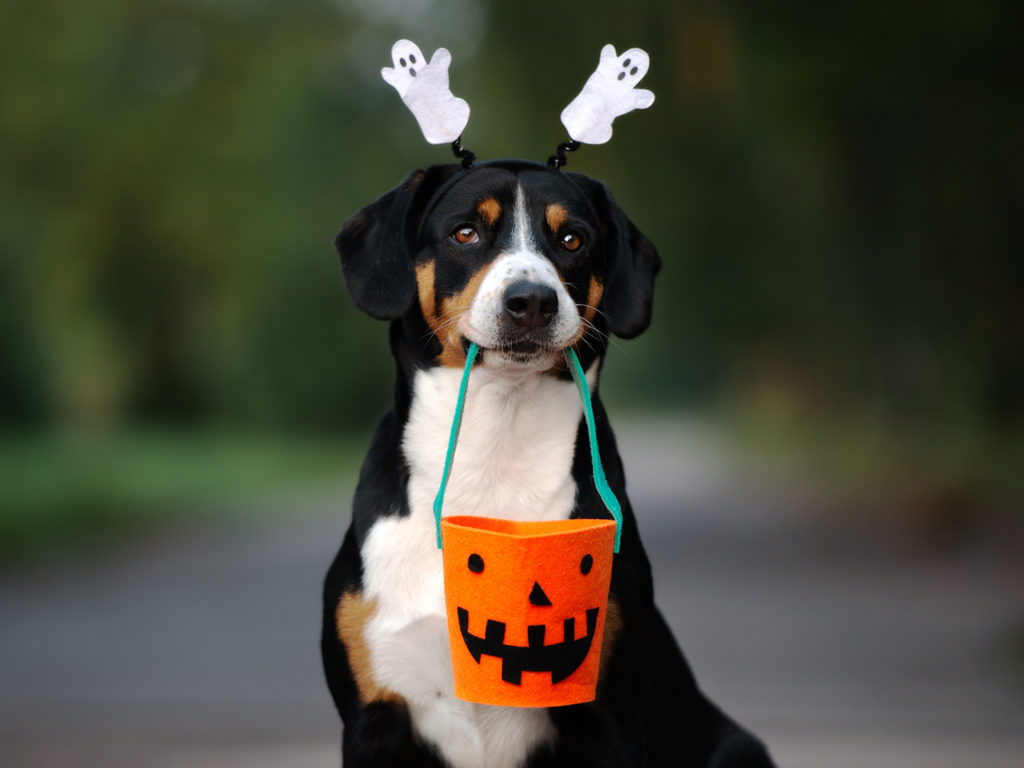Foods To Avoid Feeding Your Pet

Fall and winter holiday celebrations often include festive eats and treats—Halloween and candy are synonymous, as are Thanksgiving and turkey. As the holiday season approaches, it’s important to remember that increased candy and other holiday foods in the home may be cause for paw-se for pet parents.
Dr. Lori Teller, a clinical associate professor of telehealth at the Texas A&M School of Veterinary Medicine & Biomedical Sciences, says there are several foods people should avoid giving their pets, but especially any foods containing xylitol.
“Anything that contains xylitol should never be given to dogs,” Teller said. “It is extremely toxic and can lead to liver failure and death. It is a common replacement for sugar in many human foods, but it is so toxic to dogs that there has been legislation filed in Congress to require that any products containing xylitol be labeled as such. The bill is titled the Paws Off Act of 2021.”
Traditional holiday cooking and baking ingredients also can be dangerous for pet consumption. Some such items include chocolate, especially dark or baking chocolate; grapes or raisins; fatty foods; macadamia nuts and walnuts; bones; alcohol; raw dough; seeds and pits from fruits (such as apples, apricots, cherries, peaches); caffeinated products; avocado; and onions and garlic.
“Any dangerous foods should be stored in a pet-proof cabinet, pantry, or container,” Teller advised. “Some pets are ‘counter-surfers’ and will jump up on a counter to steal something that smells irresistible.
“One year we had hidden our Halloween candy in the coat closet so our son wouldn’t get into it before the trick-or-treaters arrived,” she said. “Unfortunately, someone didn’t make sure the closet was closed and latched, and our Labrador ate 4 pounds of Halloween candy. That was a fun trip to the veterinary hospital.”
Teller said that while some foods should be avoided in pet consumption at all costs, such as products containing xylitol and grapes or raisins, the effects of other foods are dose-dependent.
“One example is chocolate,” she explained. “If your healthy Labrador retriever gets a hold of a couple of milk chocolate M&Ms, then the risk is pretty low for any problems. However, if the dog eats a couple of squares of baking chocolate, there is a much higher risk of toxic effects and you should seek veterinary care. When in doubt, talk to your veterinarian.”
If you find yourself in a situation this holiday season where your pet has consumed something potentially detrimental to their health, The ASPCA’s Animal Poison Control can be reached at (888) 426-4435 and the Pet Poison Helpline can be reached at (855) 764-7661.
While some traditional holiday eats and treats are dangerous for pets, others can be enjoyed together in celebratory moments. “These include most fruits (minus the seeds or pits), such as apples, bananas, blueberries, and watermelon. Most vegetables are healthy as well, including carrots, green beans, chickpeas, lettuce leaves, and cucumbers,” Teller said. “White rice and plain bread in small quantities are also acceptable. Cooked chicken, turkey or fish, without the skin or bones, is also safe for pets.”
Safe pet consumption of these foods depends on portion size.
“Any treats or human foods given to pets should not exceed 10% of their dietary intake,” Teller shared. “More than this and their diet may become nutritionally unbalanced. It is always a good idea to talk with your veterinarian to make sure foods that you want to give your pet will be safe, especially if your pet has an underlying health problem.”
Keeping your pet away from potentially toxic foods may also involve educating children and visiting relatives, or even keeping the pet out of the kitchen entirely. Keeping your pet’s safety top of mind will help ensure that the entire family has a happy, healthy holiday season.
Pet Talk is a service of the School of Veterinary Medicine & Biomedical Sciences, Texas A&M University. Stories can be viewed on the web at vetmed.tamu.edu/news/pet-talk. Suggestions for future topics may be directed to vmbs-editor@tamu.edu.


